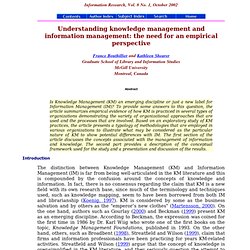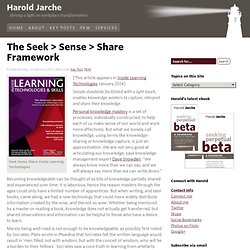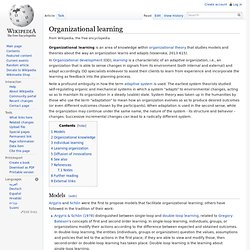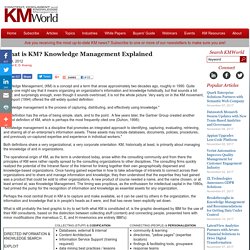

Understanding knowledge management and information management: the need for an empirical perspective. France Bouthillier and Kathleen Shearer Graduate School of Library and Information Studies McGill UniversityMontreal, Canada Abstract Is Knowledge Management (KM) an emerging discipline or just a new label for Information Management (IM)?

To provide some answers to this question, the article summarizes empirical evidence of how KM is practiced in several types of organizations demonstrating the variety of organizational approaches that are used and the processes that are involved. Based on an exploratory study of KM practices, the article presents a typology of methodologies that are employed in various organizations to illustrate what may be considered as the particular nature of KM to show potential differences with IM.
The first section of the article discusses the concepts associated with the management of information and knowledge. Introduction In the business community, there is also a strong interest for KM. Related concepts. Www.ibimapublishing.com/journals/CIBIMA/volume7/v7n7.pdf. Knowledge Management Technologies in Education. Iskme.path.net/kmeducation.pdf. Behaviorism, Cognitivism, Constructivism: Comparing Critical Features from an Instructional Design Perspective - Ertmer - 2008 - Performance Improvement Quarterly.
The Seek > Sense > Share Framework. Seek Sense Share Inside Learning Technologies [This article appears in Inside Learning Technologies January 2014] Simple standards facilitated with a light touch, enables knowledge workers to capture, interpret and share their knowledge.

Personal knowledge mastery is a set of processes, individually constructed, to help each of us make sense of our world and work more effectively. But what we loosely call knowledge, using terms like knowledge-sharing or knowledge capture, is just an approximation. We are not very good at articulating our knowledge, says knowledge management expert Dave Snowden: “We always know more than we can say, and we will always say more than we can write down.” Becoming knowledgeable can be thought of as bits of knowledge partially shared and experienced over time. Merely being well-read is not enough to be knowledgeable, as possibly first noted by Socrates. ET&S [3(2)] - Maureen Tam - Constructivism, Instructional Design, and Technology: Implications for Transforming Distance Learning. Constructivism, Instructional Design, and Technology: Implications for Transforming Distance Learning Maureen Tam Acting Director Teaching and Learning Centre Lingnan University, Tuen Mun Hong Kong, China Tel: +852 26167577 Fax: +852 25725706mtam@ln.edu.hk Introduction The paper proceeds in five stages.
![ET&S [3(2)] - Maureen Tam - Constructivism, Instructional Design, and Technology: Implications for Transforming Distance Learning](http://cdn.pearltrees.com/s/pic/th/constructivism-instructional-1143871)
Firstly, it begins with a basic characterization of constructivism, identifying what is believed to be the central principles in learning and understanding. The philosophical assumptions of constructivism are contrasted alongside objectivism, which holds very different views and approaches to learning and knowing. Secondly, the discussion ensues to identify and elaborate on those instructional principles for the design of a constructivist learning environment.
Thirdly, the role of technology is examined for its support in the construction of constructivist learning environments. Fourthly, a link is established with distance learning. Website.education.wisc.edu/kdsquire/tenure-files/50-reigeluth-ed-tech-theories.pdf. Www.indiana.edu/~syschang/decatur/reigeluth_pubs/documents/105_new_theories_for_kbsociety.pdf. Fulltext/KBTheory.pdf. Learning Theories, Learning Models, Learning Theory Summaries - in Plain English! Organizational learning. Organizational learning is an area of knowledge within organizational theory that studies models and theories about the way an organization learns and adapts (Vasenska, 2013:615).

In Organizational development (OD), learning is a characteristic of an adaptive organization, i.e., an organization that is able to sense changes in signals from its environment (both internal and external) and adapt accordingly. OD specialists endeavor to assist their clients to learn from experience and incorporate the learning as feedback into the planning process. Note a profound ambiguity in how the term adaptive system is used. The earliest system theorists studied self-regulating organic and mechanical systems in which a system "adapts" to environmental changes, acting so as to maintain its organization in a steady (viable) state.
Models[edit] Argyris and Schön were the first to propose models that facilitate organizational learning; others have followed in the tradition of their work: What is KM? Knowledge Management Explained. Knowledge Management, (KM) is a concept and a term that arose approximately two decades ago, roughly in 1990.

Quite simply one might say that it means organizing an organization's information and knowledge holistically, but that sounds a bit wooly, and surprisingly enough, even though it sounds overbroad, it is not the whole picture. Very early on in the KM movement, Davenport (1994) offered the still widely quoted definition: "Knowledge management is the process of capturing, distributing, and effectively using knowledge. " This definition has the virtue of being simple, stark, and to the point. A few years later, the Gartner Group created another second definition of KM, which is perhaps the most frequently cited one (Duhon, 1998):